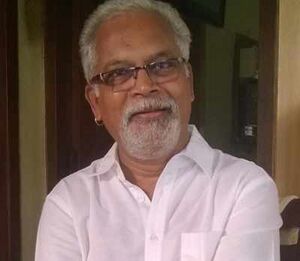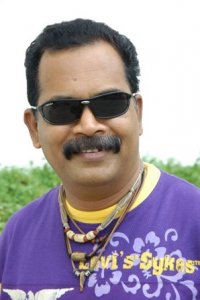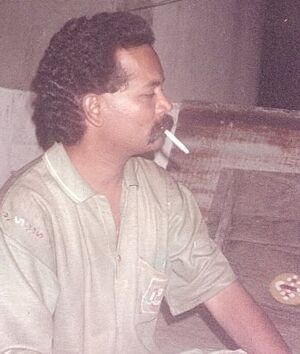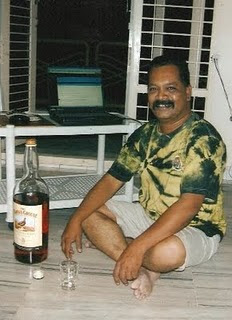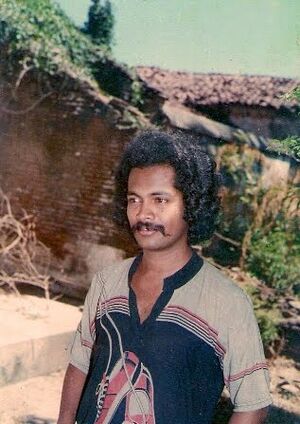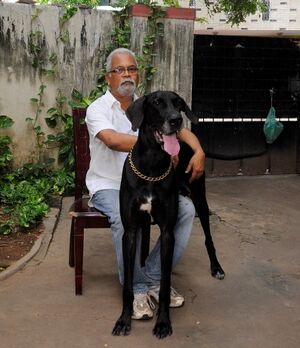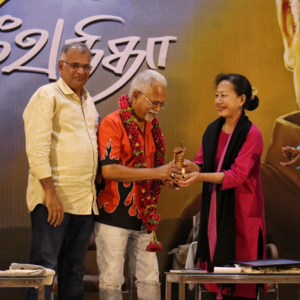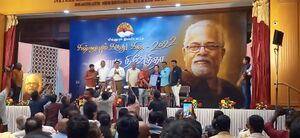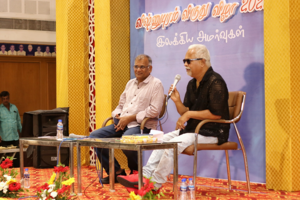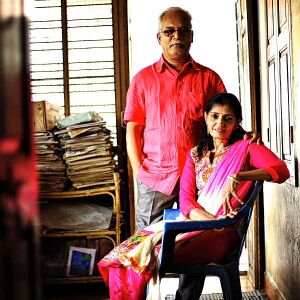Charu Nivedita
இந்தப் பக்கத்தை தமிழில் வாசிக்க: சாரு நிவேதிதா
Charu Nivedita (18 December 1953) is considered one of the foremost writers of post modern, post structuralist aesthetics and the forerunner of transgressive writing in Tamil. Charu Nivedita is known for the encyclopedic nature of his writing that combines elements from many disciplines, the metafictional and whimsical elements in his works, and for pushing the boundaries of morality and political correctness and rebelling against the system.
Birth, Education
Charu Nivedita's birth name was Arivazhagan. He adopted the name Charu Nivedita because he worked at a government job and wanted to keep his literary life separated. His pseudonym was insipired by Charu Majumdar, the founder and architect of the Naxalite movement. Charu Nivedita was born on 18 December 1953 to G. Krishnasamy and Parvathi at Idumbavanam near Thiruvarur. He completed his school education at Nagur, Pre University Course at Karaikkal and Bachelors degree in Physics at Thanjavur. Charu Nivedita joined the Government service before completing the course. A. Marx was his physics teacher at Thanjavur.
Personal Life
Charu Nivedita got married to T. G. Sugantha (Avanthika) in the year 1992. He completed typewriting and short hand courses and joined the Government service as a mid level employee. Charu Nivedita was an assistant at the office of the Inspector of Prisons in Chennai. He was then employed in the Public Distribution Department in Delhi, after which he returned to Chennai and worked as an assistant at the Postmaster's office. He retired voluntarily in the year 2001.
Literary Life
Literary life of Charu Nivedita can be divided into three periods.
Early period
Charu Nivedita had, from the very beginning, distanced himself from the modern literature in Tamil that was centered around the little magazines. He was aligned with leftist ideologies and felt that the modern writings written and circulated within a small group was futile. Charu Nivedita said that the modern literature of Tamil was entirely modernist in nature. It does not concern itself with the social trends or the political movements instead focusses only on the individual's journey and needs. According to him, these individual needs were of those elites who were excluded from the various political movements of the Tamil society, often exaggerated within a small circle. Charu Nivedita referred to this with the gibe Thayir Sadha Nunnunarvu (curd rice sensibilities) which became popular later.
Charu Nivedita's first published work was Kanavugal Sidhaithal, published under the pseudonym Nivedita, in the popular Tamil magazine Saavi. Charu Nivedita's works written from 1978 to 1990, were published in the left wing magazines like Ilakkiya Velivattam and Padigal. After he returned to Chennai in 1990, Charu Nivedita wrote short stories in popular magazines like Dinamalar, Varamalar etc. He also strongly criticized modern Tamil literature of the period. When Sundara Ramaswamy's novel JJ Sila Kurippugal was published in the year 1992, Charu Nivedita published a criticism denouncing JJ Sila Kurippugal for showcasing modernism's individualistic ideas and sectarianism. He said that the work was almost fascist in its tone and its belittlement of revolutionary ideas including Marxism.
During his stay in Delhi, Charu Nivedita was associated with the street theater of Delhi. He published a short book on revolutionary politics proposed by Sartre. He remained an exponent of leftist ideologies through the articles he wrote in various magazines during this period.
Middle period
After his transfer from Delhi to Chennai, Charu Nivedita gained the acquaintance of Ramesh Predhan, Prem and Nagarjunan. With them, he developed an interest in post modern and post structuralist ideas. Charu Nivedita was associated with the Nirapirigai magazine, published from Pondicherry. Nirapirigai combined the leftist and Periyarist ideas with the post modern perspective. Charu Nivedita says, "There were two categories in the little magazine milieu, viz., Sanatana-ism and post modernism and I belonged to the latter". His interest in post modernism led him to write non linear and metafictional works. Charu Nivedita's short story Cricketei Munn Vaithu Buthijeevigalukku Oru Muttal Sollikondathu (A word from a fool to the intellectuals in the context of cricket), published in the 26th issue of Meetchi magazine was a pioneer in this genre (published under the psedonym Muniyandi). It ridicules the modernist writings and their depictions of the inner world. His writing style transforms the story as a kind of dialogue through contradictions and refutations of its own narrative.
Charu Nivedita wrote his first novel Existentialismum Fancy Baniyanum also in the non linear, metafictional style. This iconoclastic novel ridicules and rejects his former leftist idealogies, its egoism and moralistic view. Charu Nivedita's second novel Zero Degree, considered his best by critics, is written in a sort of collage of different styles, combining journal entries, newspaper clippings, unrestrained narration and expresses a denial of inner and outer reality. He depicts the contemporary society through various conflicts.
Charu Nivedita serialised Konal Pakkangal in the Vikatan online magazine which can be considered as the beginning of the middle period. This serial introduced a variety of genres that remained unexplored in Tamil cultural sphere like the transgressive writers such as Jean Genet, Marquis de Sade, Kathy Acker, Antonin Artaud and also the alternate music trends like Cradle of Filth. It brought him many young readers.
Later period
Zero Degree can be considered the beginning of his later period. The novel touches a spiritual height through the emotions of the narrator's daughter. During this period, Charu Nivedita was interested in spiritualism and classical music and his works began to be imbued with these ideas and presented a spirituality attained through negations. He redefined the ideas he ridiculed earlier like ethics and aesthetics in his own way. He rediscovered the Modernist Tamil writers like Pudhumaipithan, Na. Pichamurthy and Ku. Azhagirisamy. He compiled his favorite stories among their works and published a book called Pazhuppunira Pakkangal. Charu Nivedita's novel Exile can be considered the transitional work to his later period.
Controversies
In the year 1982, Charu Nivedita published a criticism condemning Sundara Ramaswamy's novel JJ Sila Kurippugal and this was widely debated.
In the year 1992, Charu Nivedita staged the play entitled Rendavathu Aattam along with his friends in Madurai. There were accusations and attacks alleging that the play had crossed moral boundaries.
In the year 2010, Charu Nivedita wrote articles endorsing the controversial godman Nithyananda. Later Charu Nivedita wrote the article Sarasam Sallabam Samiyar, criticising Nithyananda when he faced sexual assault allegations. Nithyananda pursued criminal charges against Charu Nivedita.
In the year 2015, when Perumal Murugan's novel Maadhorubagan was opposed for insulting a particular caste, Charu Nivedita took a stand against Perumal Murugan. He said that disregarding the sentiments of the people is neither rebellious nor a revolution and that a writer has to write against the institutions of power and push that limits of the freedom of expression.
Awards and Recognitions
- Zero Degree was listed in the anthology '50 Writers 50 Books' edited by Pradeep Ed Sebastian and Chandra Siddan [1]
- Charu Nivedita was one among the best ten Indian writers between 2001 and 2010, chosen by Economic Times.
- Zero Degree was longlisted for the 2013 edition of Jan Michalski Prize for Literature.
- Critic Dessidre Fleming has included Zero Degree in his list of fifteen major works of Indian Literature [2]
- Kannadasan Award for the year 2019 was presented to Charu Nivedita
- Charu Nivedita was awarded the Vishnupuram Literary Award for the year 2022.
Literary Significance
Charu Nivedita's position as a writer in the Tamil literary milieu has been constantly disputed. Charu Nivedita can be considered as a literary personality and a creative writer.
As a literary personality, Charu Nivedita introduced many European, American nonconformist writers and the proponents of a different aesthetics who were not well known in the modern Tamil cultural sphere. Charu Nivedita combined literature with music, painting and cinema and talked about it as a single artistic expression. He established this alternate tradition in Tamil through his essays and columns. He has created an array of creative writers in Tamil who follow this tradition.
Charu Nivedita is a transgressive writer whose works do not adhere to the norm that believed art to be a proponent of the truth realized by a creative society or the author. His works are metafictional and a pastiche of essays, stories, autobiographies and journal entries. They cross the moral, ethical boundaries in their content and also unity in their form.
Critic Jeyamohan says that "Charu Nivedita seems to be the pioneer of trangressive fiction genre in India as far I've read. In Charu Nivedita's fictions, not only the values even the structure and form is fractured. We cannot envision a truth through his works. They are like images on a shattered mirror that cannot be unified using any theory".
Works
Novels
- Existenrtialisamum Fancy Baniyanum
- Zero Degree
- Raasa Leela
- Kaamaroopa Kathaigal
- Dhegam
- Exile
- Aurangazeeb
Short Stories
- Karnataka Murasum Naveena Tamil Ilakkiyathin Meedhana Oour Amaipiyal Aaivum - Anthology published along with the stories of Nagarjuna and Sylvia ( M. D. Muthukumarasamy)
- Nano
- Madhumitha Sonna Paambu Kathaigal
- Shakespearin Minnanjal Mugavari
- Kadal Kanni (Translated short. stories)
- Oorin Miga Azhagaana Penn ( Translated short stories)
Essay Collections
- Konal Pakkangal - Part 1
- Konal Pakkangal - Part 2
- Konal Pakkangal - Part 3
- Thisai Ariyum Paravaigal
- Varambu Meeriya Pradhigal
- Thappu Thaalangal
- Danteyin Siruthai
- Moodupani Salai
- Enakku Kuzhanthaikalai Pidikkathu
- Kadavulum Naanum
- Vaazhvathu Eppadi?
- Malavi Endroru Desam
- Kanavugalin Mozhipeyarpaalan
- Ketta Vaarthai
- Kadavulum Saithanum
- Kalaiyum Kaamamum
- Sarasam Sallabam Saamiyar
- Manam Kothi Paravai
- Kadaisi Pakkangal
- Vetrulagavaasityin Diary Kurippugal
- Pazhuppunira Pakkangal - Part 1
- Pazhuppunira Pakkangal - Part 2
- Pazhuppunira Pakkangal - Part 3
Drama
- Rendam Aattam
Film Reviews
- Lathinamerica Cinema: Oru Arimugam
- Theerakkadhali
- Kalagam Kaadhal Isai
- Cinema: Alainthu Thiribavanin Azhagiyal
- Cinema Cinema
- Naragathilirunthu Oryu Kural
- Kanavugalin Nadanam
Politics
- Azadi Azadi Azadi
- Adhikaram Amaithi Sudhanthiram
- Enge Unn Kadavul?
Interviews
- Ozhunginmayin Veriyaattam
- Ichchaigalin Irulveli (Paaliyal - Nalini Jamilavudan Oru Uraiyadal) - Second Edition
Question Answers
- Arugil Varadhe
- Aram Porul Inbam
English
- Zero Degree (Novel)
- Marginal Man (Novel)
- To Byzantium: A Turkey Travelogue
- Unfaithfully Yours (Collection of articles)
- Morgue Keeper (Selected short stories)
- Towards a Third Cinema (Articles on Latin American Cinema)
Links
- Charu Nivedita Webpage https://charuonline.com/
- Charu Nivedita's English Webpage https://charunivedita.com/
- https://youtu.be/c3Rg_-5iI34
- https://www.thehindu.com/todays-paper/tp-features/tp-literaryreview/the-best-of-indian-fiction/article4890205.ece
- https://www.mensxp.com/culture/arts/36811-15-lesser-known-yet-incredhagat-durjoy-dutta.html
- https://www.amazon.co.uk/%E0%AE Meetchi 26
- Transgressive Writing - Charu Nivedita - Jeyamohan
✅Finalised Page
